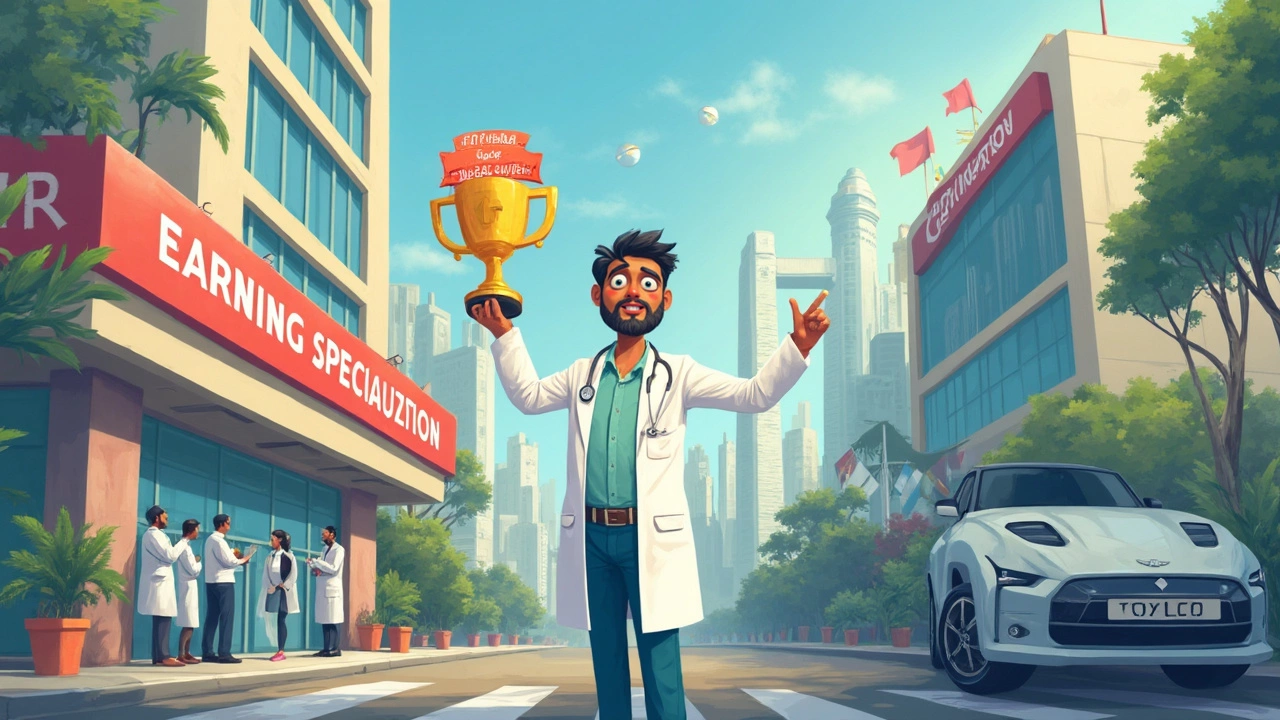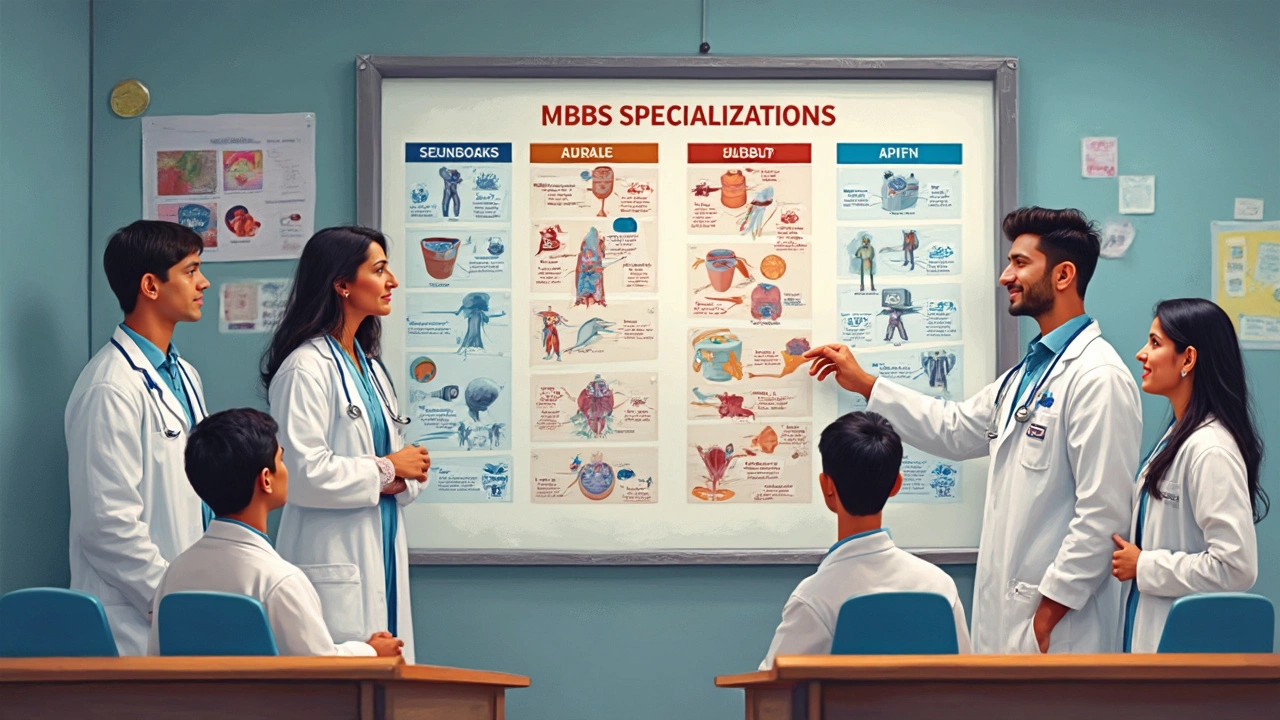Dreaming of a fat paycheck after MBBS? You’re definitely not alone. Loads of students go after medicine hoping it’ll pay off big, but the truth is—it depends a lot on what you decide to specialize in. Some branches hand over massive salaries, while others are decent but not jaw-dropping. So if you want to plan your next move wisely, you have to know which branches top the charts—and why.
Let’s cut to the chase. Super popular specializations like Radiology, Dermatology, Cardiology, Orthopedics, and Gastroenterology have a reputation for offering the fattest paychecks, both in India and abroad. But salary isn’t just about the branch’s name—city, hospital, and your experience can swing your earnings up or down. Still, the branch you pick does put you on a certain income ladder, so it’s smart to choose with your eyes wide open.
- The Highest Earning MBBS Specializations
- Why Some Branches Pay More
- The Reality Behind Salary Myths
- Tips for Picking a Branch Beyond Pay
- What to Prepare for if You’re Chasing Top Salaries
The Highest Earning MBBS Specializations
If you’re serious about chasing the big bucks after MBBS, you have to know which branches actually deliver. The healthcare sector in India is huge, but not every medical specialization throws out those legendary paychecks. Here’s where things stand as of 2024.
Among all options, a handful of branches consistently top the salary charts. Here’s a quick look at the heavy hitters:
- Radiology – Major hospitals and diagnostic labs pay well because of the huge demand for good radiologists. This field is all about interpreting imaging like X-rays, CTs, and MRIs. Specialists can also set up private practices for higher earnings.
- Dermatology – Demand for skin specialists is booming, especially in cities. Between cosmetic clinics and private practice, the pay scale keeps rising.
- Cardiology – Heart doctors are always in demand. The workload can be intense, but the pay justifies the long hours – especially in metro hospitals or popular private chains.
- Orthopedics – Bone and joint doctors do well thanks to the growing need for surgeries and rehab care, especially among sports and accident cases.
- Gastroenterology – Specializing in stomach, liver, or digestive system issues can lead to top salaries, especially if you work in a super-speciality setup.
To give you real numbers, here’s a ballpark of what these specialists can make in India after a few years of practice. These are annual salaries for well-settled doctors, not freshers:
| Specialization | Typical Annual Salary (INR) | Where the pay’s best |
|---|---|---|
| Radiology | ₹20–40 lakhs+ | Private hospitals, large diagnostic labs, metro cities |
| Dermatology | ₹18–35 lakhs+ | Urban clinics, private practice, cosmetic centers |
| Cardiology | ₹25–50 lakhs+ | Super-specialty hospitals, large private hospitals |
| Orthopedics | ₹15–35 lakhs+ | Multi-specialty hospitals, surgical centers |
| Gastroenterology | ₹22–40 lakhs+ | City hospitals, private gastro clinics |
Of course, pay varies with location, hospital reputation, your own skill level, and whether you start your own practice. These numbers are where most experienced doctors land in big cities, but with a little hustle, the ceiling is a lot higher. If you want to max out on the highest paid branch of MBBS, these specializations should be on your radar from day one.
Keep in mind, jumping into one of these branches isn’t just about money. The workload, lifestyle, and years of extra study also come with the territory. But, if being the top earner is your goal, these are the branches to aim for after NEET PG.
Why Some Branches Pay More
So, why does a skin specialist often make more than someone slogging away in general medicine? It's mostly about a few things that really swing the needle—demand, supply, risk, training, and even lifestyle. Here’s what’s driving the numbers up in some MBBS specializations.
- Scarcity: When there’s a shortage of experts in a branch, salaries go up. Think about radiologists—they’re few and far between, which means hospitals and clinics pay through the nose to get them on board.
- High-End Procedures: Specialties like cardiology and orthopedics involve high-stakes procedures. These treatments cost patients more, so doctors in these areas score a bigger share.
- Tech Power: Some branches, like radiology, use cutting-edge tech daily. This means more investment, higher skills, and bigger bills—so radiologists often take home the fattest paychecks.
- Lifestyle Demand: Who doesn’t want work-life balance? Dermatology offers easier hours with decent pay, making it super popular. High demand means higher earnings for dermatologists.
- Risk & Stress: Surgeons or cardiologists work under crazy pressure—and can’t afford mistakes. The high risk level comes with high rewards.
Check out how the average monthly salary stacks up for some of the popular MBBS branches in India (figures based on actual 2024 job postings and surveys):
| Specialization | Average Monthly Salary (INR) |
|---|---|
| Radiology | 2,50,000 - 5,00,000 |
| Cardiology | 2,00,000 - 6,00,000 |
| Dermatology | 1,50,000 - 4,00,000 |
| Orthopedics | 2,00,000 - 4,50,000 |
| General Medicine | 80,000 - 2,50,000 |
One more thing: private hospitals and big metro cities usually pay much higher than smaller towns or government hospitals. If you’re aiming for those big bucks, don’t forget location plays a huge role too. Figuring out what actually matters to you—money, lifestyle, or a certain branch—should shape your moves after NEET, not headlines or hearsay.

The Reality Behind Salary Myths
If you think every doctor with an MBBS and a fancy specialization is driving a luxury car from day one, that’s just not how it works. There’s a ton of hype and half-truths that float around NEET circles about huge paychecks. But here’s what’s actually going on.
First off, salaries for specialist doctors in India vary wildly. A lot of folks picture cardiologists or radiologists bringing home lakhs every month, and yeah, the top in private practice can earn a lot. But fresh postgrads? Most don’t hit those numbers straight away. For example, entry-level specialists in many big cities usually earn between ₹1.2 to ₹2.5 lakh per month in private hospitals—sometimes less if they’re just starting or working in smaller clinics.
Let’s clear up a few common myths:
- “Specialization guarantees wealth.” Nope. You can specialize in Orthopedics, but without strong skills or a good network, your pay might crawl while others zoom ahead.
- “Government doctors earn peanuts.” Government jobs pay less at the start—around ₹80,000 to ₹1.5 lakh per month for specialists—but they add up when you count perks like pensions, stable hours, and job security. Plus, add regular pay hikes and allowances.
- “Private practice is an instant goldmine.” Setting up your own thing takes years. You need reputation, steady patients, and some business smarts. It’s slow at first. Most doctors who earn big in private work have slogged for years before their clinics boom.
Feeling confused about what those numbers actually look like? Here’s a super simple snapshot of starting salaries by branch in big Indian cities for 2025. This is at private hospitals, not counting private practice earnings.
| Specialization | Average Starting Salary (Monthly) |
|---|---|
| Radiology | ₹2.5–4 lakh |
| Cardiology | ₹2.5–4 lakh |
| Dermatology | ₹1.5–2.5 lakh |
| Orthopedics | ₹1.5–2.5 lakh |
| General Surgery | ₹1.2–2 lakh |
Some branches do earn more, but hardly anybody gets these packages on day one after PG. Growth happens, but it’s quick only if you work at top institutions, get extra skills, or hustle hard in private practice.
One last thing—location matters a lot. Docs working in Tier-II or Tier-III cities might have lower base salaries but face less competition and can build up private practice faster than someone fighting for patients in Mumbai or Delhi. It’s not just your degree; it’s what you do with it.
Tips for Picking a Branch Beyond Pay
It’s tempting to chase the highest numbers, but before you pick a branch just for cash, think about what real life looks like in that job. Quick fact: around 90% of doctors who burn out say they weren’t really interested in their work—they just followed the money. Curious about what works better? Here’s what seasoned docs wish they knew when picking their specialty.
- MBBS is just your starting point—specialization shapes your whole lifestyle. Some branches, like surgery or emergency medicine, have unpredictable hours and more stress. Others, like radiology or dermatology, are known for regular schedules and fewer emergency calls.
- If you hate dealing with sleepless nights or high-pressure situations, consider what day-to-day life is like in each branch. Don’t just daydream about the paycheck; imagine a week in that role.
- Your own personality matters too. If you like talking to people, pediatrics or psychiatry could be your thing. If you prefer less patient interaction, fields like pathology or radiology might suit you.
- Look at job growth and demand. For example, India’s booming orthopedics market has seen a 20% jump in job opportunities over the past five years, but some branches have become saturated. Research what’s trending up and what’s getting crowded.
- Think about training time and exams. Super-specializations bring in more, but they mean spending extra years and facing more tough entrance tests (DM, MCh, etc.). If you’re not okay with long study hours, it matters.
Here’s a pro tip—talk to doctors in the real world, not just toppers or counselors. You’ll get the straight truth about both rewarding and tough parts of the job. And remember, satisfaction from making a real difference (and not just the paycheck) is what brings long-term happiness in medicine.

What to Prepare for if You’re Chasing Top Salaries
If you have your eyes on the highest paid branch after MBBS, there are some ground realities you can’t ignore. Getting into a high-paying specialization isn’t just tough—it needs intense preparation, smart decisions, and serious commitment.
First, the competition for top branches (like Radiology, Dermatology, Cardiology, Gastroenterology, and Orthopedics) is crazy. Every NEET-PG topper is gunning for these choices, so scoring a good rank is a must. Data from NEET PG 2024 shows All India Rank cutoffs for Radiology and Dermatology often fall within the top 500, and seats are limited.
Next, you need to keep up strong academics right from MBBS. Many students start building their foundation for PG entrance during their third or fourth year itself. If you slack off early, catching up gets brutal.
Extra certifications and fellowships can help. Doing additional training in hot skills—like advanced imaging tech for Radiology or cosmetic procedures for Dermatology—tends to push salaries higher later on.
| Specialization | NEET PG Rank Cutoff (Top Govt Institutes, 2024) |
Avg Starting Salary per month (INR) |
|---|---|---|
| Radiology | 1–400 | 1,50,000 – 3,00,000 |
| Dermatology | 1–700 | 1,00,000 – 2,50,000 |
| Cardiology (After MD/MS) | Super specialty (DM) <1,000 | 2,00,000 – 5,00,000 |
| Orthopedics | 1–900 | 1,00,000 – 2,50,000 |
Here’s what to really focus on if you want to land in these top spots:
- Hit the books, seriously: Scoring top NEET-PG ranks has to be your biggest goal. Make a tight study plan, join quality test series, and revise like your life depends on it.
- Work on application, not just mugging: Most PG exams now focus on clinical problem-solving, not rote facts.
- Network with seniors and professors: They know the real stuff about placements, branch work-life balance, and salary trends.
- Start internships or online shadowing in your field: Gets you hands-on skills and can help your CV stand out for super-specialty seats later on.
- Don’t ignore soft skills: Communication, good patient handling, and teamwork matter in private hospitals and corporate healthcare, where the best salaries come in.
And just so you know: after you grab that top branch seat, long duty hours and high expectations will start. Specialists in private metro hospitals often work more than 60 hours a week, at least for the first few years. But if you’re willing to push, the payoff is real—and it’s a game-changer for your career.
